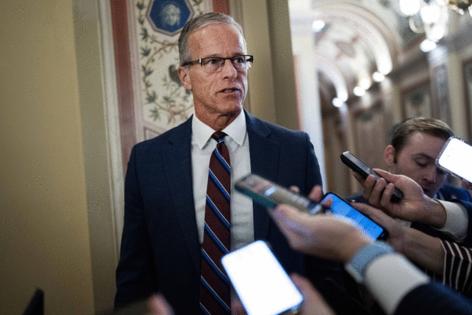Major spending package on Senate floor next week faces doubts
Published in Political News
WASHINGTON — A Senate plan to take up a major fiscal 2026 appropriations package on the floor next week is looking increasingly like a long shot.
After finally bringing a 43-day partial government shutdown to an end, Senate leaders were eager to get going on long-delayed appropriations work for the fiscal year that began Oct. 1.
Majority Leader John Thune, R-S.D., had said he intends to take up the Defense spending bill next week and, with unanimous consent, attach as many as four additional bills to the measure to pass a massive package making up most of the year’s discretionary spending. Those bills could include Labor-HHS-Education, Commerce-Justice-Science, Interior-Environment and Transportation-HUD.
But that plan, while still possible, is now facing some strong headwinds, sources familiar with the discussions said Friday.
While those bills emerged from the Senate Appropriations Committee with bipartisan support, Thune would need unanimous consent to attach them in a “minibus” package. Recent history has shown it can take weeks to secure such consent, and the measures under consideration for next week are some of the most difficult annual spending bills to pass.
The decision to give up Monday as a legislative work day doesn’t help either. The Senate isn’t scheduled to convene until late Tuesday, creating a short work week that could end Thursday night as lawmakers try to scramble home for the Thanksgiving recess.
Three full-year bills — Agriculture, Legislative Branch and Military Construction-VA — were included with the funding extension that reopened the government earlier this week. Those bills totaled roughly $187 billion, leaving nine more bills for Congress to pass before the new Jan. 30 deadline, when current funding runs out for most federal agencies.
House ‘cardinals’ to plot strategy
House GOP appropriators, meanwhile, are set to huddle next week to map out a game plan, House Appropriations Chairman Tom Cole, R-Okla., said Wednesday.
Cole said the so-called cardinals, or subcommittee chairs, will review the progress made thus far. He said he would “set them loose to start negotiating with their counterparts” and “see if we can find some common ground.”
Lawmakers in both chambers are staring down a mountain of funding work to complete. None of the remaining bills have gone through the level of House-Senate negotiations as the package enacted this week, appropriators say.
As a more modest next step, Cole has promoted a smaller three-bill package than what the Senate is considering. It would feature the Energy-Water, Interior-Environment, and Transportation-HUD measures, while delaying the two biggest annual bills: Defense and Labor-HHS-Education.
Cole has said that path would allow appropriators to keep bills moving without the need to reach an overall topline spending agreement, which is sure to prove difficult. But he has made clear lawmakers could go with a larger measure, depending on leadership’s desires.
House Transportation-HUD Appropriations Subcommittee Chairman Steve Womack, R-Ark., said he sees his bill, along with the Energy-Water and Interior-Environment measures, as the next batch.
Womack said he has had conversations with Senate Transportation-HUD Appropriations Subcommittee Chair Cindy Hyde-Smith, R-Miss., and expects “conversations here very soon” with his Democratic colleagues.
House Interior-Environment Appropriations Subcommittee Chairman Mike Simpson, R-Idaho, said informal talks have been happening at the staff levels on the Republican side in both chambers.
“We’re gonna work hard to get them done, starting next week,” Simpson said. So far, the House has approved all 12 funding bills in committee, while the Senate committee has greenlit eight.
Appropriations status check
The Senate Appropriations Committee has not held markups for its Energy-Water, Financial Services, Homeland Security and State-Foreign Operations bills, and it’s not clear if it will. If the parties can’t reach a bipartisan agreement on those measures, it’s possible Senate Republicans would post partisan versions of the bills, as a starting position for later negotiations.
The House has moved three of its own bills that emerged from committee across the floor: Defense, Energy-Water and Military Construction-VA. While appropriators want more full-year bills to move forward on the floor, the chamber’s thin majorities make any future action on that front unlikely for the moment.
And House leadership has a pile of other priorities after keeping the chamber out of town for nearly two months during the shutdown to up the pressure on the Senate.
“It’s not the failure on the part of the appropriators,” Womack said. “It’s the lack of the resolve by the Congress writ large to put a priority on this work – and, you know, thin majorities.”
_____
©2025 CQ-Roll Call, Inc., All Rights Reserved. Visit cqrollcall.com. Distributed by Tribune Content Agency, LLC.
























































Comments